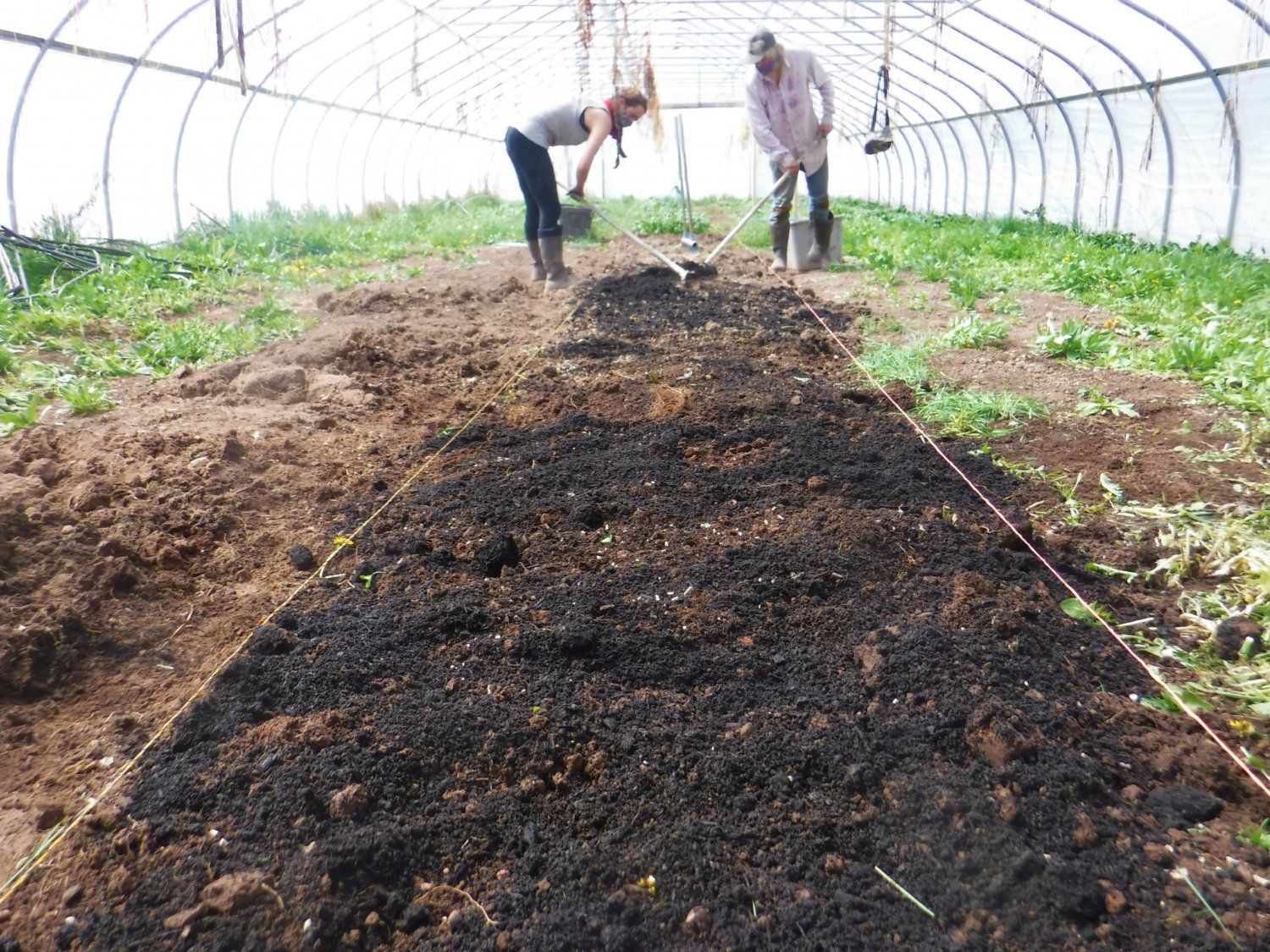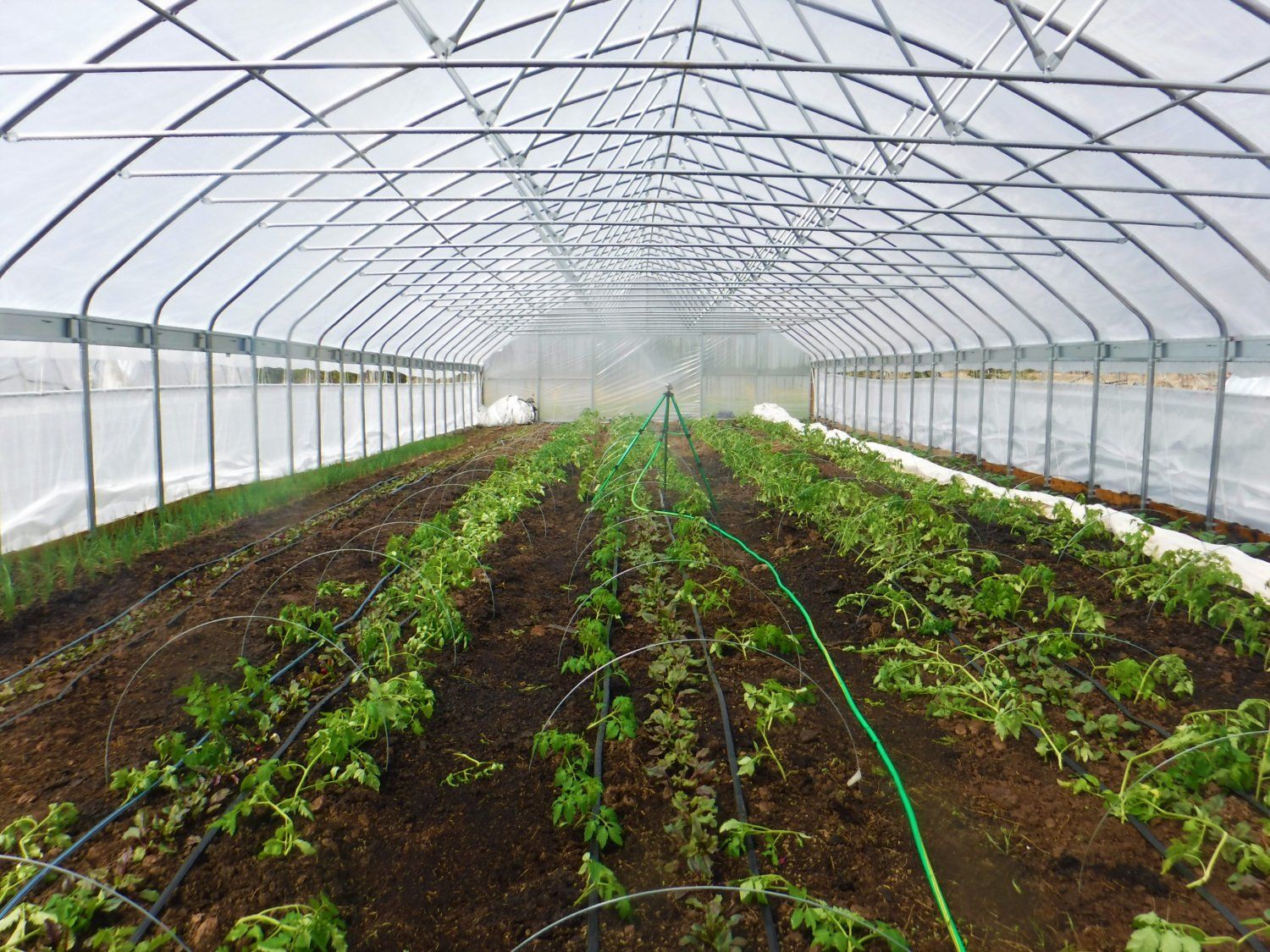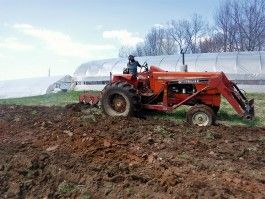Wow, it's hard to believe it's already been a week since the last farm happenings! It feels like time is speeding up now that spring is arriving. Buckle up, cause ready or not, here we go.
After harvesting spinach for this week's delivery, we began the tedious process of tearing out all the remaining spinach plants and turning those beds over to get ready for cukes and tomatoes. We had a few beds that we were hoping to leave for another week, but unfortunately all of our overwintered spinach got hit with a leaf spot infection this week, which necessitated removing all plant debris to reduce inoculum. You can see the white spots on the leaves in the picture above with Farmer Ryan. It's a big bummer to lose all that remaining spinach, but that's farming sometimes.
The good news is that the new seedings of spring spinach are up and looking great - they are in different hoophouses than our winter spinach was in, and should be clear of any leaf spot infections. We'll keep a close eye on it, and if we see any start to crop up we'll pull those plants and their neighbors quickly to keep any disease in check.
We had been hoping to begin transplanting tomatoes and cukes this week, however the weather looks like it's gonna be mighty cold again (one more time??) this weekend, dangit. Our forecast is calling for 23 degrees on Saturday night, which is just too cold for heat lovers like tomatoes and cukes, even with some supplemental heaters in the hoophouses to keep the worst of the cold away AND row covers on top of the plants. This fall, I hope we will be able to install "real" heaters in some of the hoophouses, so that when we do get that odd very cold night or two (or three...) we won't have to worry about plants freezing, getting up in the night to change propane tanks on small portable heaters. We only have ONE shot at these tomatoes and cukes, so we have to get it right the first time. No do-overs. Mother Nature plays a pretty hard game.
The good news is that our tomato and cucumber beds are all ready - broadforked, topped with compost, and raked smooth. The tomato transplants are getting HUGE now, so Monday it's GO TIME to get them all transplanted. Here you can see Farmer Ryan hoeing the compost in and the beds smooth in one of our hoophouses.
Meanwhile, we've begun the first round of field prep for outdoor production - a sure sign of spring if there ever was one! Below you can see Farmer Alex on our field tractor, lovingly referred to as "The Legendary 180!" in these parts. And by "these parts" I pretty much mean our 60 acres :) One field that Alex plowed will be destined for a summer cover crop of sorgum sudan grass to smother weeds and build soil carbon, and the other field will be planted with a summer melon trial starting in June in partnership with UW Extension and the Seedlinked organization. Melons can be mighty tricky in our wet climate, so we hope to evaluate some varieties to see which ones perform and most importantly TASTE the best when grown in our region.
It sure feels good to get some dirt worked up again outside! Next job for the plow will be working up ground for onion transplants, as well as the first seeding of carrots and sugar snap peas, and the first broccoli and cabbage transplants. Next week, after we get tomatoes and cukes transplanted, we'll be moving on planting these crops outside.
Before we got working in the fields, I spent half a day changing oils and filters and greasing up our field tractor. As my mechanic mentors and fellow farmers Tom and Matt Cogger of Maple Hill Farm have told me many times, "Oil is cheaper than steel." Putting off routine maintenance can be tempting, but paying that couple hundred bucks worth of filters and fluids regularly is sure cheaper than an $8,000+ engine rebuild and having a tractor out of commission for a few months. We're getting better at maintaining these old tractors, and I was happy to see that the oils we drained out still looked like they had some life in them. The less life they have left in them when you change them, the less life your engine has left in it, and those engines are a lot harder to change than the oils.
We've learned plenty of maintenance tricks over the years, but my favorite one is to write on each filter with a sharpie the date that the filter and fluids were changed, plus the initials of the person who changed it. We record that kind of information in our Field Log too, but written on the tractor it's an easy reminder and there's no need to look back in the Field Log to see when things were done last. Keep it easy.
Finally - good news on the microgreen label front: our Spicy Mustard Mix micro labels were approved and finally arrived this week! Now that we have labels, we'll be ramping up production of these micros to have them available on a weekly regular basis. Thanks for your patience while we have been getting these labels up and running. For micros this week, we'll also have pea shoots, micro radish, micro cilantro, and some more micro sampler boxes as well. Eat your greens!
Well, that's it from the farm this week. I hope you have a great weekend ahead, and thanks so very much for making us your farmers! See you next week.
In community,
Farmer Chris
Great Oak Farm

.JPG)
.JPG)
.JPG)
.JPG)
.JPG)
.JPG)
.JPG)



